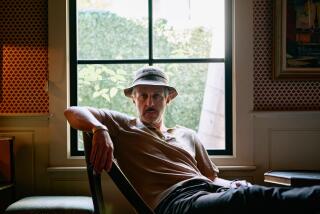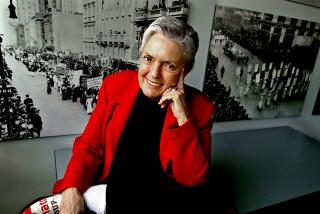Picture of Devotion : Lady Rachel, 103, and Son Eddie: ‘What Would I Do Without Him?’
- Share via
Rachel Cohn knows what a good cup of tea should do--scald the tip of your tongue.
“I’m from England, dahling,” says Cohn, known to all as Lady Rachel. “And if there’s anything I should know, especially at my age, it’s a lovely cup of boiling, hot tea.”
Of course, Cohn has come to know about lots more than tea in her 103 years. She knows opera and ballet. She knows how to rumba and waltz. And there once was a time when she could swing a mean tennis racket.
“But mostly,” she says, “I know how fortunate I am to have a son like Eddie.”
Eddie Calder--who brings the anticipated cup of tea to his mom--is the youngest of three children. Almost 70, he has been married for 45 years, is the father of two married daughters and grandfather to two children. He plays baseball and sells disability insurance.
Once--sometimes more--each day, Calder visits his mother at the Jewish Homes for the Aging in Reseda, often bringing licorice, flowers or lemon meringue pie. He has visited her daily for the nearly three decades she has lived in nursing homes. He takes her out to lunch, sits with her in the sunlight and compliments her bob of silver hair. Bring up the subject of mom, and he’ll reach into his coat pocket for a bundle of photographs of Cohn that range from child to centenarian.
Rachel and Eddie are the picture of devotion.
“What would I do without you?” Cohn asks. “I tell every mother she should have a son like him. Is that the truth? Am I right, Eddie?” she asks robustly.
Calder blushes. He blushes a lot, especially when he’s around Lady Rachel.
“Yes, you’re right, mother, darling.” He rolls his eyes and shakes his head like an embarrassed schoolboy.
“Eddie has got something that is so royal and genuine,” says Cohn. “He comes to see me every day. He brings me nice things, things I don’t ask for, things that come from the heart. I appreciate all those little gestures. I love him dearly. I could just bite him with love.”
Calder laughs. He squishes his mother’s face with his palms: “You are something else, mother. Something else.”
“I think boys have a special relationship with their mother,” says Calder’s wife, Pat, a teacher. “I’m not jealous at all. I can’t visualize a time when (Rachel) won’t be in this world and when Eddie won’t be visiting her.”
Born in Manchester, England, in 1889, Cohn was 11 years old when her parents and three siblings immigrated to the United States and soon settled in Brooklyn. In 1914 she married Louis Cohn, a furniture store owner and insurance agent, who died at age 70. The couple were married for almost 40 years. Cohn, who uses a wheelchair when she is not exercising on a walker, never remarried.
“I had married the best,” she says.
Their union produced three children, seven grandchildren and three great-grandchildren. Cohn’s other son, Maurice Calder, is a theatrical agent who guards his age, and her daughter, Harriet Hochberg, 73, teaches sculpture at the University of Judaism in Los Angeles. (Maurice changed his surname to Calder when he entered show business; Eddie later took the same last name.)
Cohn doesn’t like to play favorites when it comes to her children.
“Each one of them is like a piece of gold,” she says, adding that Maurice, who lives in Woodland Hills, and Harriet, in West Hills, always visit her on weekends. But it is Calder, in North Hollywood, who never tires of seeing his mom every day.
“Here I am almost 70 and it is simply wonderful to say, ‘I still have my mother living.’ I can visit her. I can give her a kiss. I feel like a kid when I’m around her.”
“I have seen her be a survivor.”
That she is.
At the age of 8, she suffered an infection that resulted in the removal of part of a bone in her left arm. She still has difficulty using that arm.
“But I didn’t let that hold me back. I played tennis. I don’t know what I did with the other (injured) arm. I guess it just hung there,” she says.
About two years ago, she injured her hips in a fall that forced her to use a walker and wheelchair. She gets angry with herself because the infirmities of aging--broken hips, failing eyesight, lapsing memory and a heart condition--have slowed her down.
“Sometimes I would love for someone to give me something to fall asleep and die. Sometimes I pray not to wake up in the morning. I wish I would die during my sleep.
“I keep on thinking, ‘How does a person feel when they know they are going to die?’ I would like to know that feeling. Sometimes my heart palpitates so, I think I am going.
“But then sometimes I ask myself, ‘Why am I alive?’ It must be because I still have a purpose on Earth.”
And as long as she’s alive, Cohn says she will continue to do what she does best: give advice.
To children: “Be honest. Have a good character. Be respectable. Don’t get mischievous and don’t get into gangs. Give your parents pleasure instead of worries. It is no pleasure for parents to see a child being dragged into jail. And when you grow up, give something to the world.”
To parents: “Take care of your health because then you can take care of your children.”
To women: “There is more in life to being a housewife and a mother. If you want to go to college or be a working woman, do it. Find a way. Don’t limit yourself.”
Not going to college, says Cohn, is her only regret.
But she made up for it by devoting much of her life to serving others.
During World War II she was a Red Cross volunteer. Later she served on the board of directors of and was a volunteer at the Israel Zion Hospital in Brooklyn when she wasn’t working as an insurance agent to make ends meet at home.
“Throughout my entire life I have been greatly rewarded by the people I have met.
“Only now,” Cohn says, “at times I feel like a cripple in this wheelchair. I get angry at myself because as old as I am, I would very much love to go dancing or play tennis again. I can only do those things in my mind. But when I do, it’s intoxicating.”
Despite her health problems she still has a sense of humor and a craving for lemon meringue pie.
And whenever she has the opportunity to offer a toast, it usually goes like this, she explains, holding up her cup of tea:
Here’s to you, as good as you are, and here’s to me as bad as I am. But as good as you are, and as bad as I am, I’m as good as you are as bad as I am.
Lady Rachel takes a sip and makes a funny face. The tea is cold.
Calder leaves the room for a fresh cup of scalding tea.
“I tell all the women I know and don’t know, ‘You should have a son like my Edwin.’ ”


